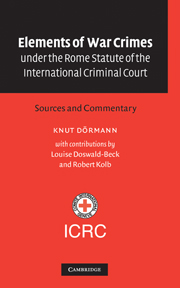 Elements of War Crimes under the Rome Statute of the International Criminal Court
Elements of War Crimes under the Rome Statute of the International Criminal Court Book contents
- Frontmatter
- Contents
- Foreword by Dr Jakob Kellenberger, President of the International Committee of the Red Cross
- Foreword by Ambassador Philippe Kirsch, QC
- Table of cases by alphabetical order
- Table of cases by jurisdiction
- Table of treaties and other international instruments
- List of abbreviations
- 1 Introduction
- 2 Legal value of the elements of crimes
- 3 General Introduction adopted by the PrepCom
- 4 Introduction to elements of war crimes listed in Article 8 of the Rome Statute
- 5 Article 8(2)(a) ICC Statute – Grave breaches of the 1949 Geneva Conventions
- 6 Article 8(2)(b) ICC Statute – Other serious violations of the laws and customs applicable in international armed conflict
- 7 Article 8(2)(c) ICC Statute – Violations of common Article 3 of the 1949 Geneva Conventions
- 8 Article 8(2)(e) ICC Statute – Other serious violations of the laws and customs applicable in armed conflicts not of an international character
- Appendix: Request from the Governments of Belgium, Finland, Hungary, Mexico, the Republic of Korea and South Africa and the Permanent Observer Mission of Switzerland to the United Nations regarding the text prepared by the International Committee of the Red Cross on the mental element in the common law and civil law systems and on the concepts of mistake of fact and mistake of law in national and international law
- Bibliography
- Index
6 - Article 8(2)(b) ICC Statute – Other serious violations of the laws and customs applicable in international armed conflict
Published online by Cambridge University Press: 08 August 2009
- Frontmatter
- Contents
- Foreword by Dr Jakob Kellenberger, President of the International Committee of the Red Cross
- Foreword by Ambassador Philippe Kirsch, QC
- Table of cases by alphabetical order
- Table of cases by jurisdiction
- Table of treaties and other international instruments
- List of abbreviations
- 1 Introduction
- 2 Legal value of the elements of crimes
- 3 General Introduction adopted by the PrepCom
- 4 Introduction to elements of war crimes listed in Article 8 of the Rome Statute
- 5 Article 8(2)(a) ICC Statute – Grave breaches of the 1949 Geneva Conventions
- 6 Article 8(2)(b) ICC Statute – Other serious violations of the laws and customs applicable in international armed conflict
- 7 Article 8(2)(c) ICC Statute – Violations of common Article 3 of the 1949 Geneva Conventions
- 8 Article 8(2)(e) ICC Statute – Other serious violations of the laws and customs applicable in armed conflicts not of an international character
- Appendix: Request from the Governments of Belgium, Finland, Hungary, Mexico, the Republic of Korea and South Africa and the Permanent Observer Mission of Switzerland to the United Nations regarding the text prepared by the International Committee of the Red Cross on the mental element in the common law and civil law systems and on the concepts of mistake of fact and mistake of law in national and international law
- Bibliography
- Index
Summary
Elements common to all crimes under Article 8(2)(b) ICC Statute
Text adopted by the PrepCom
The conduct took place in the context of and was associated with an international armed conflict.
The perpetrator was aware of factual circumstances that established the existence of an armed conflict.
Commentary
These two elements describing the subject-matter jurisdiction for war crimes under Art. 8(2)(b) of the ICC Statute, i.e. ‘other serious violations of the laws and customs applicable in international armed conflict’, are drafted in the same way for all crimes in this section. They are defined in exactly the same manner as for the crimes defined under Art. 8(2)(a). Reference may therefore be made to the commentary on that section (5.1.).
In this context, some clarification as to the notions ‘war crimes’, ‘grave breaches’ and ‘other serious violations’ used in the Statute seems to be warranted. It is important to emphasise that not all war crimes are in fact grave breaches, which are specifically listed in the Geneva Conventions, and in AP I for the States Party to it. War crimes cover both ‘grave breaches’ and other serious violations of the laws and customs applicable in armed conflict – be that conflict international or non-international. While this distinction is not important in the context of the ICC Statute because the Statute does not stipulate different consequences for the two categories, it is relevant for the national implementation of international humanitarian law.
- Type
- Chapter
- Information
- Elements of War Crimes under the Rome Statute of the International Criminal CourtSources and Commentary, pp. 128 - 381Publisher: Cambridge University PressPrint publication year: 2003
